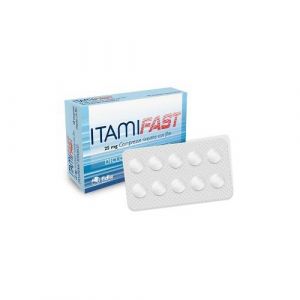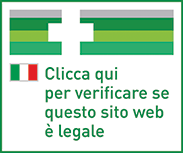Ship in Europe, Find out rates!

Itamifast 25 mg Diclofenac Potassium Analgesic 10 Tablets
Potassium diclofenac tablets.
Therapeutic indications
Itamifast Tablets are used in adults in acute painful conditions such as headache, toothache, muscle or joint pain, back pain and primary dysmenorrhea. In children and adolescents it is used as a short-term symptomatic treatment of pain associated with painful inflammation of the ear, nose or throat, eg. pharyngitis, tonsillitis, otitis and in the short-term symptomatic treatment of postoperative pain after minor surgery.
Dosage and posology
Itamifast Tablets is used according to the following indications:
- Adults and adolescents over 16 years: 25 mg every 4-6 hours as directed. The highest recommended daily dose is 150 mg.
- Children and adolescents: Children aged 9 years and older (min.35 kg body weight) and adolescents should be treated with doses up to 2 mg / kg body weight per day in 3 divided doses, depending on the severity of the disorder.
Overdose
Administration of 300 mg - 3 g in adults usually causes only mild intoxication. 2.8 g administered over the course of a week caused intestinal perforation in an adult patient; 2 g in an adult patient caused renal effects. Reversible bone marrow necrosis due to overdose of diclofenac administered intramuscularly for renal colic in a dose of 75 mg repeated at 30 minute intervals for 12 doses for a total dose of 900 mg has been reported.
There is no typical clinical picture caused by overdose with diclofenac. Overdose may cause symptoms such as nausea, vomiting, gastrointestinal bleeding, diarrhea, abdominal pain, dizziness, somnolence, headache, tinnitus, anxiety, hallucinations, renal effects, in rare cases hepatic effects, a tendency to edema, possible metabolic acidosis or seizures . In case of significant poisoning, acute renal failure and liver damage are possible.
Management of acute poisoning with NSAIDs, including diclofenac, mainly consists of supportive measures and symptomatic treatment. Supportive measures and symptomatic treatment should be given for complications such as hypotension, renal failure, seizures, gastrointestinal disturbances and respiratory depression. Special measures such as forced diuresis, dialysis or haemoperfusion are unlikely to help eliminate NSAIDs, including diclofenac, due to its high protein binding and extensive metabolism. Activated charcoal may be considered after ingestion of a potentially toxic overdose, while gastric decontamination (e.g. vomiting, gastric lavage) may be considered after ingestion of a potentially life-threatening overdose. Antacids, supplemented if necessary with sucralfate. Ensure the efficiency of diuresis. Symptomatic treatment.
Contraindications
- Known hypersensitivity to the active substance or to any of the excipients.
- Active gastric or intestinal ulcer, bleeding or perforation.
- History of gastrointestinal bleeding or perforation related to previous NSAID therapy.
- History of recurrent peptic ulcer / haemorrhage or recurrent peptic ulcer / active bleeding (two or more distinct episodes of ulceration or bleeding)
- Last trimester of pregnancy
- Conditions that cause an increased tendency to bleed.
- Severe hepatic insufficiency ,.
- Hepatic porphyria.
- Severe renal insufficiency (glomerular filtration rate> 30 ml / min).
- As with other non-steroidal anti-inflammatory drugs (NSAIDs), diclofenac is also contraindicated in patients whose attacks of asthma, urticaria or acute rhinitis are exacerbated by acetylsalicylic acid or other NSAIDs.
- Overt congestive heart failure (NYHA class II-IV), ischemic heart disease, peripheral arterial disease and / or cerebral vasculopathy.
Side effects
Gastrointestinal disturbances are the most commonly reported side effects. About 10% of patients experience these effects at the start of treatment. These side effects usually disappear after a few days, even if treatment is continued. Peptic ulcers, gastrointestinal perforation or bleeding may occur, particularly in elderly patients. These problems can occur at any time during treatment, with or without warning symptoms and with or without a history of the disease. Diclofenac causes temporary inhibition of platelet aggregation which can lead to an increased risk in patients with various bleeding conditions. Exceptionally, cases of severe infectious skin and soft tissue complications occur during chickenpox.
- Disorders of the blood and lymphatic system
- Very rare: Thrombocytopenia, leukopenia, anemia (including haemolytic and aplastic anemia), agranulocytosis.
- Disorders of the immune system
- Rare: Hypersensitivity, anaphylactic and anaphylactoid reactions (including hypotension and shock).
- Very rare: Angioneurotic edema (including face edema).
- Psychiatric disorders
- Very rare: Disorientation, depression, insomnia, nightmares, irritability, psychotic disorders.
- Nervous system disorders
- Common: Headache, dizziness
- Rare: Somnolence
- Very rare: Paresthesia, memory impairment, convulsions, anxiety, tremor, aseptic meningitis, taste disturbance, cerebrovascular accident.
- Eye disorders
- Very rare Visual disturbances, blurred vision, diplopia.
- Ear and labyrinth disorders
- Common: Vertigo
- Very rare: Tinnitus, hearing impairment.
- Cardiac pathologies
- Very rare Palpitations, chest pain, heart failure, myocardial infarction.
- Vascular pathologies
- Very rare Hypertension, vasculitis.
- Respiratory, thoracic and mediastinal disorders
- Uncommon: Bronchospasm
- Rare: Asthma (including dyspnoea)
- Very rare: Pneumonia.
- Gastrointestinal disorders
- Common: Epigastric pain, nausea, vomiting, diarrhea, abdominal pain, dyspepsia, flatulence, anorexia.
- Rare: Gastritis, gastrointestinal haemorrhage, haematemesis, haemorrhagic diarrhea, melaena, gastrointestinal ulcer (with or without bleeding or perforation).
- Very rare: Intestinal narrowing of the diaphragmatic type. Colitis (including haemorrhagic colitis and exacerbation of ulcerative colitis or Crohn's disease), constipation, stomatitis (including ulcerative stomatitis), glossitis, esophageal disorder. Pancreatitis.
- Hepatobiliary disorders
- Common: Increased transaminases (AST, ALT).
- Rare: Hepatitis, jaundice, liver disorders.
- Very rare: Fulminant hepatitis, hepatic necrosis, hepatic failure.
- Skin and subcutaneous tissue disorders
- Common Rare Very rare Rash. Urticaria. Bullous rash, eczema, erythema, erythema multiforme, Stevens-Johnson syndrome, toxic epidermal necrolysis (Lyell's syndrome), exfoliative dermatitis, hair loss, photosensitivity reaction, purpura, allergic purpura, pruritus.
- Renal and urinary disorders
- Very rare: Acute renal failure, haematuria, proteinuria, nephrotic syndrome, interstitial nephritis, renal papillary necrosis.
- Reproductive system and breast disorders
- Rare: Impotence (questionable causal relationship)
- General disorders and administration site conditions
- Rare: Edema
Pregnancy and breastfeeding
The systemic concentration of diclofenac, compared with oral formulations, is lower after topical administration. Referring to experience with NSAID treatment for systemic administration, the following is recommended: Inhibition of prostaglandin synthesis may adversely affect pregnancy and / or embryo / fetal development. Results of epidemiological studies suggest an increased risk of miscarriage and cardiac malformation and gastroschisis after use of a prostaglandin synthesis inhibitor in early pregnancy. The absolute risk of cardiac malformations increased from less than 1% to approximately 1.5%. The risk was believed to increase with dose and duration of therapy. In animals, administration of prostaglandin synthesis inhibitors has been shown to cause increased pre- and post-implantation loss and embryo-fetal mortality. Furthermore, an increased incidence of various malformations, including cardiovascular, has been reported in animals administered prostaglandin synthesis inhibitors during the organogenetic period. During the first and second trimester of pregnancy, diclofenac should not be administered except in strictly necessary cases. If diclofenac is used by a woman attempting to conceive, or during the first and second trimester of pregnancy, the dose should be kept as low as possible and the duration of treatment as short as possible.
During the third trimester of pregnancy, all prostaglandin synthesis inhibitors can expose the fetus to:
- cardiopulmonary toxicity (with premature closure of the arterial duct and pulmonary hypertension);
- renal dysfunction, which can progress to renal failure with oligohydroamnios.
The mother and the newborn, at the end of pregnancy, may be exposed to:
- possible prolongation of bleeding time, and antiplatelet effect which may occur even at very low doses;
- inhibition of uterine contractions resulting in delayed or prolonged labor.
Consequently, diclofenac is contraindicated during the third trimester of pregnancy. Like other NSAIDs, diclofenac passes into breast milk in small amounts. However, effects on the infant are anticipated at therapeutic doses of Itaminon. Due to the lack of controlled studies in breastfeeding women, the product should only be used during breastfeeding under the advice of a healthcare professional. In this circumstance, Itaminon should be applied to the breasts of nursing mothers, nor elsewhere on large areas of skin or for an extended period of time.
Special warnings
Undesirable effects can be minimized by administering the lowest effective dose for the shortest duration necessary to control symptoms
The concomitant use of Itamifast with systemic NSAIDs including selective cyclooxygenase-2 inhibitors should be avoided due to the absence of any evidence demonstrating synergistic benefits and the possibility of additive side effects. For medical reasons, caution is advised in elderly patients. In particular, the use of the lowest effective dose is recommended in frail elderly patients or in those with low body weight. Elderly patients have an increased risk of adverse reactions to NSAIDs particularly gastrointestinal bleeding and perforation which can be fatal. It is also more likely to patients
elderly people suffer from renal, cardiac or hepatic impairment.
As with other NSAIDs, allergic reactions, including anaphylactic / anaphylactoid reactions without recent exposure, may occur in rare cases with diclofenac.
to the drug. As with other NSAIDs, itamifast may mask the signs and symptoms of infections due to its pharmacodynamic properties.
Expiry and retention
Check the expiration date indicated on the package. The expiry date indicated on the package refers to the product in intact packaging, correctly stored. Store in the original package in order to protect from moisture.
Warning: do not use the medicine after the expiry date indicated on the package.
Composition
One Itamifast 25 mg tablet contains:
Active principle
25 mg of diclofenac potassium.
Excipients
Mannitol, Potassium hydrogen carbonate, Sodium lauryl sulfate, Macrogol, Crospovidone, Magnesium stearate.
